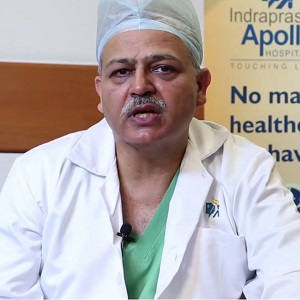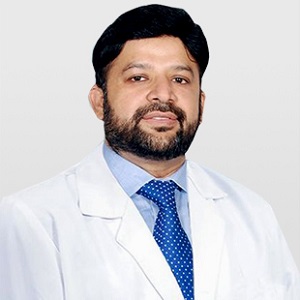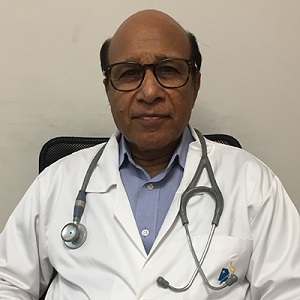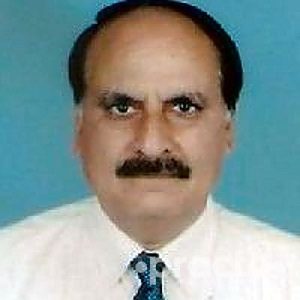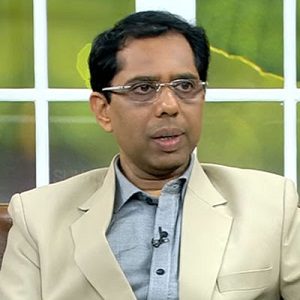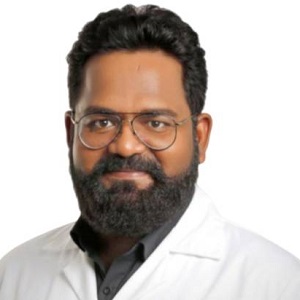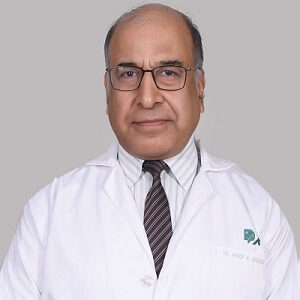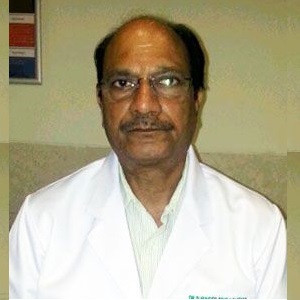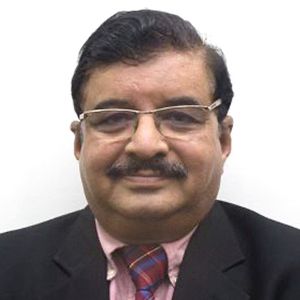Best Doctors in India for Surgical Thrombectomy
- Vascular Surgeon, New Delhi, India
- Over 35 years’ experience
Profile Highlights:
- Dr. Rakesh Mahajan is one of the best Vascular Surgeons in India. He has an experience of 35 years.
- He is a member of the Vascular Society of India and other eminent societies.
- Dr. Rakesh Mahajan is experienced in the diagnosis and treatment of vascular and related disorders.
- He qualified for the prestigious Intercollegiate Exam in the UK and was awarded a CCST certificate.
- Vascular & Endovascular Surgeon, New Delhi, India
- Over 18 years’ experience
Profile Highlights:
- Dr. Suhail Naseem Bukhari is a well-known Vascular Surgeon with an experience of 18 years.
- He is proficient in carrying out procedures such as Spinal and Cerebral Tumor Embolization, Angioplasty and Stenting, Embolization for Fibroid, Head, and Neck Tumour Embolization and Acute Stroke Thrombectomy, etc.
- Vascular Surgeon, New Delhi, India
- Over 35 years’ experience
Profile Highlights:
- Dr. Jaisom Chopra is the epitome of all the Vascular Surgeons in India as well as abroad.
- He has performed more than 7000 surgeries in his lifetime.
- Dr. Chopra’s chief field of interest lies in surgeries related to varicose veins.
- Vascular Surgeon, New Delhi, India
- Over 23 years’ experience
Profile Highlights:
- Dr. K K Pandey is one of the best Vascular and Endovascular surgeons in India; currently working with Indraprastha Apollo Hospitals, New Delhi as a consultant.
- He has experience of over 2 decades in vascular surgery. Dr. Pandey is trained to diagnose and manage various simpler to the life-threatening health issues.
- His specialization includes diabetic foot treatment, Varicose Veins Treatment & Surgery, Venous Angioplasty & Stenting, MV replacement, chest tumors, and Sclerotherapy.
- Dr. Pandey has a couple of book publications, research, and award for excellent surgical skills to his credit.
- Vascular Surgeon, Chennai, India
- Over 30 years’ experience
Profile Highlights:
- Dr. V Balaji is currently working in Chennai, Tamil Nadu as an expert Vascular Surgeon.
- He has treated numerous people with chronic and acute problems, which include Pediatric and geriatric populations too.
- He is currently in touch with a fellowship related to endo Vascular Surgery and pancreas transplantation.
- Vascular Surgeon, Gurugram, India
- Over 20 years’ experience
Profile Highlights:
- Dr. Himanshu Verma has been a well-known vascular surgeon for the last two decades. He worked in the USA (Mayo) for several years apart from his decade of experience in the top medical centers of India.
- He has performed innumerable surgeries throughout his life including 3000 complex AV Fistula for Hemodialysis Patients.
- Dr. Himanshu Verma is one of those first persons, who nurtured the idea of performing vascular surgeries under Local Anaesthesia. This way numerous patients across the globe can walk away from the Post Anaesthesia complications.
- Cardiothoracic Surgeon and Vascular Surgeon, New Delhi, India
- Over 42 years’ experience
Profile Highlights:
- Dr. Anoop K Ganjoo is one of the best cardiologists & cardiothoracic surgeons in India with a total experience of 42 years.
- Dr. Ganjoo has a rich experience of over two decades in several complicated procedures, like Mitral valve repair and replacement, Peripheral and Coronary angiography & angioplasty, vascular surgery, ICD, diffuse coronary artery disease, Pacemaker, Radiofrequency ablation of arrhythmias, adult Cardiothoracic Surgery, CRT implantation, Balloon valvuloplasty, and PDA device closure.
- Vascular Surgeon, Gurugram, India
- Over 38 years’ experience
Profile Highlights:
- Dr. Surinder Singh Khatana is an eminent name in the country for conducting more than 1000 vascular surgeries to date.
- He has been the chief cardiac surgeon at various prestigious hospitals both nationally and internationally.
- He has served in the Indian Army for 30 years.
- Vascular Surgeon, New Delhi, India
- Over 35 years’ experience
Profile Highlights:
- Dr. (Col) Kumud Rai belongs to the top class of Vascular Surgeons in India. He has more than 25 years of experience in being a Vascular Surgeon.
- Dr. Kumud Rai has been a Tutor for the Royal College of Surgeons in the UK and an examiner in several MCHs.
- Dr. Rai has spent a major part of his life serving the Indian Army in both educational and professional sectors.
Best Hospitals in India for Surgical Thrombectomy
Indraprastha Apollo Hospital, New Delhi
- City: New Delhi, India
Hospital Highlights:
- Indraprastha Apollo Hospital is a 700-bedded multispecialty hospital in the heart of the capital of India. It is a part of Apollo Hospital group, one of India’s most reputed healthcare chains. Indraprastha Apollo Hospital has been accredited by Joint Commission International, making it the first internationally accredited hospital in the country in 2005.
- There are 52 specialties in the hospital with one of the best cardiology centers in the country. The hospital is also equipped with State of the art infrastructure facilities with the largest Sleep Lab in Asia and the largest number of ICU bed facilities in India.
- The hospital also has one of the largest dialysis units in India along with a dedicated Bone Marrow Transplant unit.
- The latest and highly advanced technologies that are installed in the hospital include Da Vinci Robotic Surgery System, PET-MR, PET-CT, Cobalt-based HDR Brachytherapy, Brain Lab Navigation System, Tilting MRI, Portable CT scanner, 3 Tesla MRI, 128 Slice CT scanner, DSA Lab, Endosonography, Hyperbaric Chamber and Fibro scan.
Fortis Memorial Research Institute, Gurugram
- City: Gurugram, India
Hospital Highlights:
- Fortis Memorial Research Institute is a multi-super-specialty, quaternary care hospital with 1000 beds. The hospital comprises reputed clinicians, and international faculty and is also equipped with cutting-edge technology. The hospital is a part of Fortis Healthcare Limited, a reputed chain of private hospitals in India.
- It is a NABH-accredited hospital that is spread across 11 acres of land and has a capacity of 1000 beds. The hospital has 55 specialties and is one of the premier health care centers in the Asia Pacific region popularly known as “the Mecca of Healthcare”.
- The hospital has 260 diagnostic centers and is also equipped with the latest and advanced techniques that include 3 Telsa which is the world’s first Digital MRI technology. The hospital also has world-class Radiation Therapy techniques which have been developed by leading technology experts from Elekta and Brain Lab.
Apollo Hospital, Chennai
- City: Chennai, India
Hospital Highlights:
- Apollo Hospitals, Chennai, is one of the best hospitals for heart care in India. Over the years, Apollo has expanded all over India, as a healthcare chain.
- India’s first ‘Only Pancreas’ transplant was performed in Apollo Hospital. The hospital is known for successfully performing Asia’s first en-bloc combined heart and liver transplant, and over the years, it has attained a remarkable achievement in the global healthcare space. Around 3-4 organ transplants are performed in the hospital per day.
- Equipped with over 500 beds, this hospital in Chennai was established in 1983 and since then has been among the most preferred hospital for patients from all over the world.
- The hospital holds accreditation of the NABH and JCI and is the first hospital in India to be ISO 9001 and ISO 14001 certified. It is also the first South Indian Hospital to receive subsequent reaccreditation from the JCI USA 4 times.
Medanta-The Medicity, Gurgaon
- City: Gurugram, India
Hospital Highlights:
- One of India’s best and largest multi-specialty hospitals, Medanta was built with the aim to bring India to the highest standards of medical care. The hospital has been providing the best medical services to its patients, since its inception, with care, commitment, and compassion.
- Equipped with 1250 beds, the hospital was founded by Dr. Naresh Trehan in the year 2009 with an aim to provide the best medical care at affordable costs. The hospital is spread across 43 acres and includes 45 operation theatres and 350 beds dedicated solely to ICU. The hospital includes over 800 doctors, and more than 22 specialty departments and has a dedicated floor for individual specialty in order to offer the best services under one roof.
- The hospital is considered one of the premier institutes in India for Cardiac Care and includes staffs and members of high caliber. The hospital has 6 distinct centers of excellence.
Max Super Specialty Hospital, New Delhi
- City: New Delhi, India
Hospital Highlights:
- One of the well-regarded providers in India committed to the highest standards of clinical excellence and patient care, Max Super Specialty Hospital is a part of Max Healthcare, which is the second-largest healthcare chain in India. Regarded as one of the most well-regarded healthcare providers in the country, Max Super Specialty Hospital is committed to the highest standards of clinical excellence as well as patient care. The hospital is also equipped with the latest technology as well as cutting-edge research. The hospital is known to deliver and ensure the highest level of patient care.
- The hospital has more than 500 beds and offers treatment for over 35 specialties. The hospital also holds the credit of having installed the first Brain Suite in Asia. This is a highly advanced Neurosurgical machine that allows MRI to be taken while surgery is ongoing.
- Other advanced and latest technologies are also installed in the hospital such as the 1.5 Tesla MRI machine, 64 Slice CT Angiography, 4D ECHO, LINAC, and 3.5T MRI machine.
Artemis Hospital, Gurugram
- City: Gurugram, India
Hospital Highlights:
- One of the most well-known hospitals in the Delhi NCR, Artemis Hospital is the first hospital in Gurugram to get accredited by the Joint Commission International.
- With more than 40 specialties, the hospital has been designed to be one of the most technically advanced hospitals in the country, with the best medical and surgical health care. The hospital has eleven special and dedicated centers, for Heart, Cancer, Neurosciences, etc.
- The latest technologies in the hospital include Endovascular Hybrid Operating Suite and Flat panel Cath Labs for the cardiovascular department, 3 Tesla MRI, 16 slice PET CT, 64 Slice Cardiac CT Scan, HDR Brachytherapy, and highly advanced Image Guided Radiation Therapy techniques (LINAC) are installed in the hospital.
- The hospital has won several awards as well, since its inception.
BLK Max Super Specialty Hospital, New Delhi
- City: New Delhi, India
Hospital Highlights:
- Equipped with 650 beds, BLK Superspecialty Hospital is the largest stand-alone private sector hospital in Delhi.
- With over 1500 healthcare providers and 150 globally renowned super specialists, the hospital is one of Asia’s largest Bone Marrow Transplant Centres. The hospital is known for having some of the best cancer doctors in the country.
- The hospital is NABH and NABL accredited and was inaugurated by the first Prime Minister of India. Pt. Jawahar Lal Nehru.
Gleneagles Global Hospitals, Chennai
- City: Chennai, India
Hospital Highlights:
- Established in 1999, Gleneagles Global Hospital, Chennai, is one of the top healthcare facilities in Southern India. It is part of the Gleneagles Hospital Chain, which is the fourth largest healthcare chain in the country. The hospital specializes in multi-organ transplants of kidneys, liver, lungs, heart, etc.
- The hospital has an excellent infrastructure and state-of-the-art lab and equipment set-up. The hospital boasts cutting-edge technologies, a highly skilled team of doctors and surgeons, and trained support staff. Located in Perumbakam, Chennai, it is one of India’s premier health care destinations. The hospital has performed some of the most complex surgical and clinical procedures in India including multi-organ transplantations.
- The hospital’s lung transplantation program is one of the best in the country. The hospital is known for having performed India’s first single lung transplant and first minimal invasive lung transplant. It is also the only Indian hospital to be associated with King’s College Hospital, London, United Kingdom for liver transplantations.
Fortis Hospital, Mulund, Mumbai
- City: Mumbai, India
Hospital Highlights:
- Fortis Hospital in Mulund is a 315-bed multi-speciality tertiary care hospital with five JCI accreditations that offers a wide variety of diagnostic and therapeutic services. The Fortis Hospital in Mulund delivers patient-centred treatment with cutting-edge technology, highly skilled and experienced surgeons, and paramedical staff.
- This institution houses Maharashtra’s largest multi-organ transplant centre. It is also the first heart transplant centre in western India to conduct 100 or more consecutive heart transplants in under four years. It is the only hospital in the city to have multi-organ transplants and has handled the youngest patient for angioplasty. Fortis Hospital Mulund now boasts the first advanced surgical robot in central Mumbai.
- Cardiology and heart surgery, urology, nephrology, neurosciences, orthopaedics, digestive care, emergency and critical care, and maternity care are among the services provided by the hospital.
Kokilaben Dhirubhai Ambani Hospital, Mumbai
- City: Mumbai, India
Hospital Highlights:
- Kokilaben Dhirubhai Ambani Hospital, Named after the wife of Indian industrialist Dhirubhai Ambani, the founder of Reliance Industries, this is one of the top hospitals in Mumbai. This 750-bed multi-specialty hospital became operational in 2009. Known as one of India’s most advanced tertiary care facilities, the hospital is designed to raise India’s global standing as a healthcare hub, with an emphasis on excellence in clinical services.
- Kokilaben Dhirubhai Ambani Hospital uses Protocol and Care Pathway based treatment models to ensure the best outcomes for patients.
- The hospital represents a confluence of top-notch talent, cutting-edge technology, state-of-the-art infrastructure, and, most importantly commitment.
- The hospital also holds the accreditation of the NABH, NABL, CAP, and JCI.
- The hospital has been recognized as the No. 1 Multispecialty Hospital in Mumbai and the West Zone for the fifth year in a row in 2020 by The Week.
Surgical Thrombectomy
Surgical thrombectomy is a surgery for removing a blood clot from one of your blood vessels. The blood clot might be in an artery or vein in your leg, arm or another part of your body and it might be blocking blood flow to your tissues or organs.
Blood usually flows freely through your blood vessels, arteries and veins to carry oxygen and nutrition to various parts of your body. Sometimes, however, the blood can thicken and clump to form blood clots in one of these vessels. This leads to the blood flow getting blocked and when this happens, nearby tissues can get damaged.
Purpose
A surgical thrombectomy is required when you have a blood clot in an artery or vein. Sometimes, the procedure might be needed for a blood clot in an organ or other part of the body. Several problems can be caused by a blood clot, which includes:
- Swelling, numbness or pain or tingling in the arm or leg
- A cold feeling in the area
- Enlarged veins
- Muscle pain in the area
- Loss of function of an organ
- Death of tissue
- Blood clot moving to the lung that causes breathing trouble and risk of death (pulmonary embolism)
Surgical thrombectomy is usually advised by your doctor usually when you are having a very large clot. He/she might advise surgery if the blood clot is causing severe tissue injury. However, it is worth noting that there are various kinds of treatment for blood clots. Generally people with blood clots are treated with medicines which are known as blood thinners. You can receive them through an injection or through an IV. They prevent blood clots from getting larger.
Preparation
You might require a few tests before the surgery. They include the following:
Ultrasound
Ultrasound can help to see a DVT as well as to measure the flow of blood in your leg.
Blood tests
Venogram
Venogram is performed for getting images of the blood clot and of your veins.
CT scan
CT scan is done for getting detailed images of your blood clot.
MRI
MRI is also performed to get more detailed images of the blood clot.
You might need to stop taking some medicines before the procedure, which includes blood thinners and aspirin. If you smoke, your doctor might ask you to stop it before your surgery. Smoking can interfere with your healing.
If possible, it is important that you arrange for someone to take you home from the hospital since you will be unable to drive yourself. Avoid eating or drinking after midnight the night before your procedure. Keep in mind that you need to follow any additional instructions from your doctor.
Procedure
An IV is put in your arm or hand before the procedure begins. You will receive your medicines through this IV. You might also receive a blood thinner, as this can prevent blood clots from forming during your procedure.
You will also receive anesthesia through the IV line. This will help you get unconscious during the procedure and prevent any pain. Any hair in the surgery area might require removal as well.
Throughout the surgery, your surgeon might be using X-ray images continuously. He/she will make a cut in the area above your blood clot and then open the blood vessel to take out the clot.
Sometimes, a balloon attached to a thin tube can be used in the blood vessel to remove any remaining part of the clot. Your doctor might use a stent in the blood vessel to keep it open.
Then your doctor will close and repair your blood vessel and let the normal blood flow restore. After this, the incision in your skin is closed and bandaged.
After the procedure
You will need to spend some time in a recovery room. Your vital signs, such as your heart rate and breathing will be monitored by the healthcare team. You should be able to go home the same day. You might receive instructions from your doctor regarding activity, medicines and caring for the incision site.
After you go home, you might be requiring medicines for stopping blood clots from forming. You might also need to take medicines to prevent any clots before any future surgery. If you feel you need pain medicine, you can take it.
Avoid any kind of strenuous activity for some days. Try to wear loose clothing as it can help your blood flow smoothly, thus preventing clots from forming. Try to avoid smoking as it can lead to blood clots.
If you experience any of the following, you need to inform your doctor:
- Swelling or pain that gets worse
- Chest pain
- Weakness or numbness near the surgery area
- Symptoms of a blood clot, such as swelling, pain, warmth and redness
- Bleeding from the incision or other areas
- Fever
- Shortness of breath or trouble breathing
Risks
Sometimes there is a risk that your blood clot might form again. Depending on your general health, your risks can vary and how your blood clots. They can also vary depending on how long you have had the clot and its location on your body. Some other risks include:
- Excess bleeding that might even lead to death
- Reaction to anesthesia
- Infection
- Damage to the blood vessel at the site of the blood clot
- Pulmonary embolism

